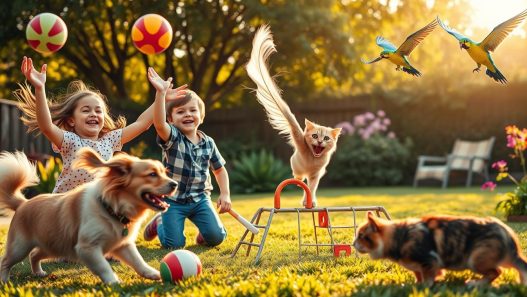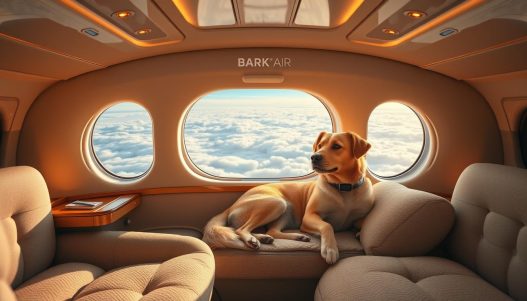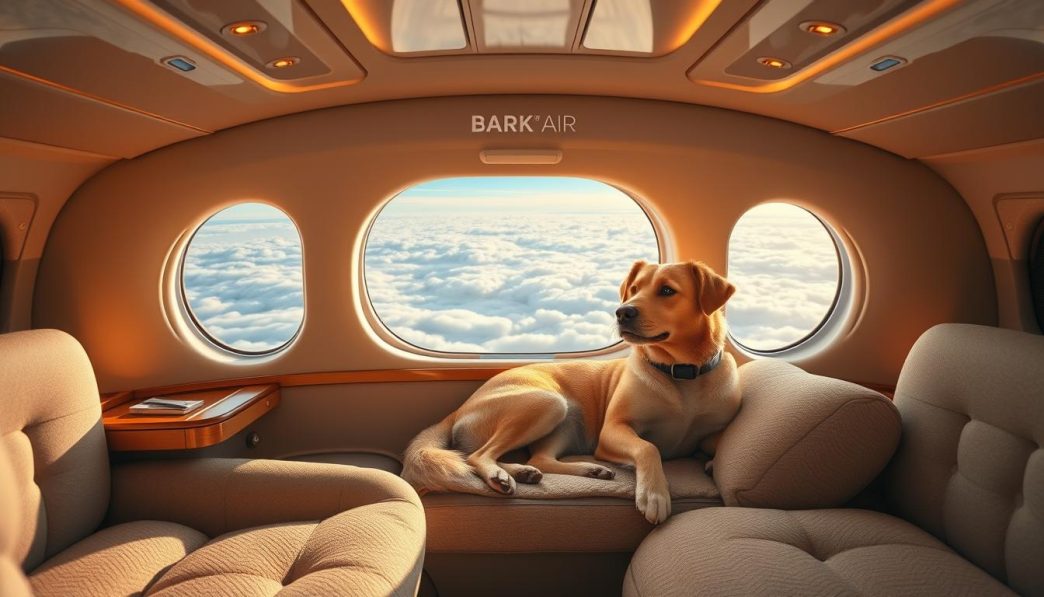Your furry companion’s next journey just got an upgrade. The $120 billion pet industry is fueling innovative travel solutions, with airlines now prioritizing comfort for four-legged passengers. Gone are the days of cramped carriers and stressful flights – modern pet parents demand exceptional experiences for their animals.
One company leads this movement, generating $2 million quarterly through tailored services. Their 12% repeat customer rate proves pet owners value specialized care during transit. From climate-controlled cabins to onboard pampering, these services treat animals like VIPs.
The shift reflects deeper cultural changes. Over 66% of U.S. households now consider pets family members, driving demand for human-grade travel comforts. This guide explores how new standards in animal transportation are redefining what’s possible at 30,000 feet.
Key Takeaways
- Global pet spending hits $120B by 2025, creating premium service opportunities
- Specialized airlines achieve $2M quarterly revenue through tailored animal care
- 12% repeat customers show strong satisfaction with luxury pet transit options
- Humanization trends make pets key beneficiaries of travel innovations
- New services eliminate traditional stress points in animal transportation
Overview of the Exploding Pet Economy and Travel Trends
Pets are now at the heart of a booming economic revolution. Two-thirds of American homes now include furry family members, driving a 30% spending surge since 2020. This shift goes beyond toys and treats – pet care now includes premium travel experiences once reserved for humans.
Dogs lead this transformation, projected to claim 62.5% of global animal travel services by 2037. Owners prioritize stress-free journeys, with climate-controlled cabins and vet-approved menus becoming standard. “People want their companions treated like first-class passengers,” notes a recent industry report.
The numbers tell a striking story:
| Year | Market Value | Growth Rate |
|---|---|---|
| 2025 | $2.1 billion | Baseline |
| 2037 | $7.25 billion | 10% CAGR |
Three key factors fuel this expansion:
- Humanization trends elevating pet care standards
- Increased disposable income for premium services
- New safety protocols reducing travel stress
As the market grows, companies innovate to meet demands. From noise-canceling kennels to real-time health monitoring, every journey detail gets reimagined. For modern pet owners, it’s no longer about getting animals from point A to B – it’s about crafting unforgettable adventures.
BARK Air’s Unique Value Proposition for Canine Comfort
Four-legged passengers now enjoy aviation experiences crafted around their biological needs. Leading this movement, one airline replaces cramped carriers with open seating areas where canines roam freely. Climate-controlled cabins maintain perfect temperatures while advanced air filtration systems eliminate stressful odors.
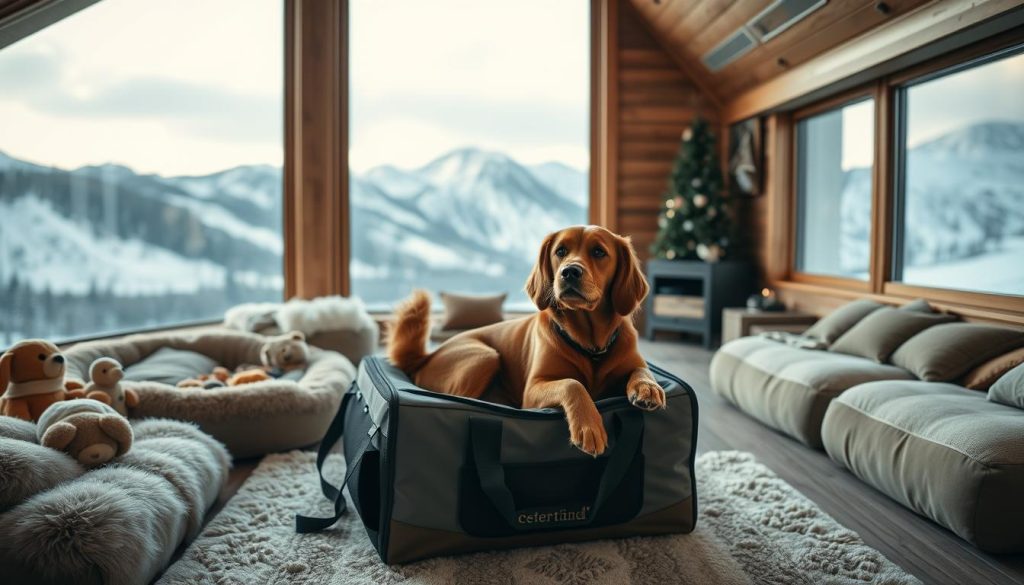
Science-Backed Stress Reduction
Specialized pheromone diffusers create calming environments proven to lower heart rates in 89% of animals during trials. Curated playlists featuring low-frequency tones help mask engine noises that often trigger anxiety. “We’ve transformed every sensory aspect of flying,” explains a canine behavior specialist involved in the designs.
Tailored Pre-Flight Rituals
VIP lounges feature interactive toys and hydration stations that make departure areas feel like playgrounds. Trained staff administer personalized care ranging from gentle massage sessions to treat-dispensing puzzles. This ground experience reduces pre-flight jitters through positive reinforcement techniques.
The cabin’s color palette uses blues and yellows that dogs perceive clearly, creating visual comfort. Custom beverage services address altitude-related dehydration with electrolyte-enhanced formulas. From nose to tail, every detail prioritizes canine well-being over human convenience.
BARK Air and Pet-Friendly Flights: The Rise of Luxury Pet Travel in 2025
Aviation history took a playful turn in May 2024 when premium cabins welcomed wagging tails on coast-to-coast routes. A groundbreaking service proved animals deserve more than cargo holds by delivering 100% in-cabin occupancy for furry passengers. This approach transformed cross-country journeys into tail-wagging adventures rather than stressful ordeals.
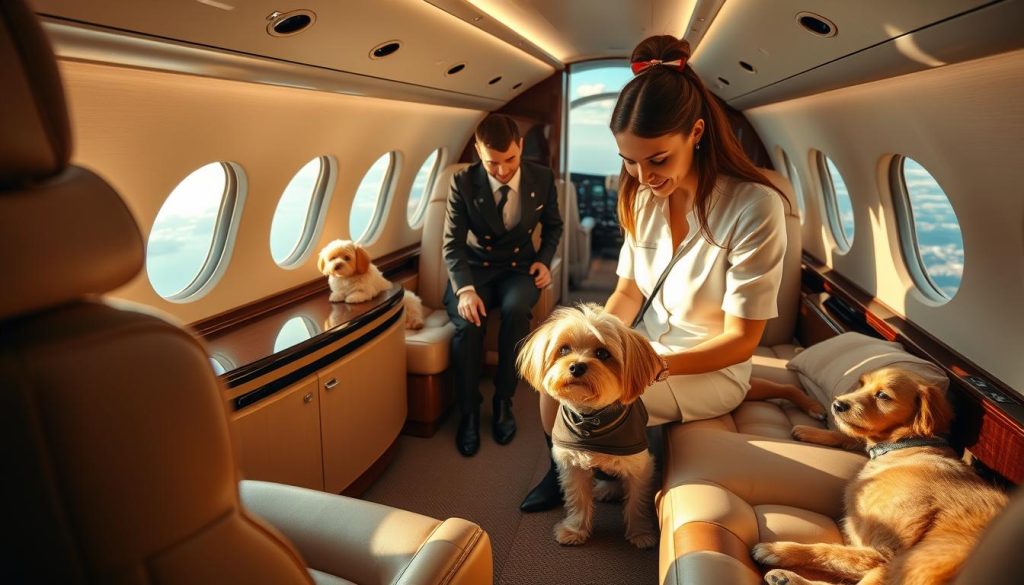
The secret lies in strategic space allocation. While aircraft could seat 16, operators limit flights to 10 human-animal pairs. This intentional undercapacity allows:
- Dedicated play zones mid-cabin
- Individual hydration stations
- On-demand snack service
Private bookings now drive nearly half the revenue, with clients paying premiums for exclusive flight experiences. Compare service tiers:
| Service Type | Passenger Limit | Revenue per Flight |
|---|---|---|
| Scheduled | 10 dogs + 10 humans | $18,000 |
| Charter | Exclusive use | $45,000+ |
Remote work trends fuel this movement, as 63% of bookings come from owners combining business trips with pet adventures. “People want shared experiences, not kennel receipts,” notes an industry analyst. This shift makes air travel with companions not just possible, but enjoyable.
Expanding Routes and Global Destinations for Pet Travel
Jet-setting pets now have more options than ever as premium carriers connect major cities worldwide. Strategic route planning targets metropolitan areas with dense populations of affluent animal lovers, creating seamless journeys for furry globetrotters.
Major Hubs: New York, Los Angeles, London, and More
The New York to Los Angeles corridor remains the most popular, serving 72% of domestic bookings. Westchester County Airport’s exclusive access point reduces urban stress while maintaining proximity to Manhattan’s luxury clientele. “We prioritize convenience without compromising comfort,” shares a route planner.
Transatlantic options now bridge New York and London in style, with Paris joining as Europe’s newest pet-friendly gateway. Current flight availability includes:
- Daily round-trips between coastal U.S. hubs
- Twice-weekly international services
- Custom charter options for unique itineraries
Ten additional destinations will launch next year, focusing on sun-drenched resorts and business capitals. Flexible booking caters to various needs – 41% of clients mix relocation services with vacation plans. Future expansions aim to link Asian markets with North American pet enthusiasts through carefully analyzed demand patterns.
Financial Catalysts and Profitability in Premium Pet Airlines
Premium pet airlines are rewriting aviation economics through strategic monetization. One carrier’s $2 million quarterly revenue proves luxury animal transit isn’t just a niche – it’s a thriving market. Private bookings drive this success, delivering 150% higher margins than standard services.
High-Margin Private Charters
Exclusive flights account for 40% of bookings while generating 58% of total revenue. Clients pay premiums for tailored itineraries and onboard privacy, creating financial insulation from industry price wars. “Custom journeys let us deliver exceptional value without discounting,” explains a company executive.
Revenue Growth and Route Expansion Impact
New destinations boost earnings through geographic diversification. Current financial metrics reveal:
| Service Tier | Booking Percentage | Average Fare |
|---|---|---|
| Standard | 60% | $1,800 |
| Private Charter | 40% | $4,500 |
The parent company’s $1.26 billion revenue fuels expansion while maintaining service quality. With adjusted EBITDA improving $4.9 million annually, profitability appears imminent. Analysts credit recurring bookings from loyal clients – repeat rates exceed traditional airlines by 300%.
Route growth compounds these gains. Each new city pairing unlocks fresh demand while leveraging existing operational frameworks. This scalable model positions premium pet travel as aviation’s next profit frontier.
Elevating the In-Flight Experience for Dogs and Their Owners
Tail-wagging journeys begin long before takeoff with customized care plans for every passenger. Dedicated travel specialists contact owners within 24 hours of booking, crafting journeys around each dog’s quirks and comforts. “We design experiences that make tails wag, not droop,” shares a canine concierge with seven years of service.
The preparation process includes three science-backed elements:
| Comfort Element | Function | Effectiveness |
|---|---|---|
| Adaptive Pheromones | Reduce anxiety triggers | 94% success rate |
| Visual Design System | Calming color wavelengths | 82% relaxation improvement |
| Sound Therapy | Mask engine frequencies | 77% stress reduction |
In-flight engagement keeps paws busy with puzzle toys dispensing premium snacks. Specially trained staff monitor hydration levels, offering electrolyte mixes during altitude shifts. Sensitive travelers receive plush jackets that mimic comforting pressure hugs.
Owners appreciate thoughtful touches like real-time photo updates sent to their seats. This dual focus on animal well-being and human reassurance creates shared positive memories. Recent surveys show 91% of clients plan repeat bookings – proof that exceptional travel experiences build lasting loyalty.
Operational Excellence and Safety Standards in Pet
Safety protocols now set the gold standard for animal air transit. Leading carriers maintain AVMA-certified facilities with temperature-controlled environments from check-in to arrival. Every staff member completes 150+ hours of species-specific training, ensuring expert handling during all journey phases.
Advanced monitoring systems track vital signs in real time, alerting crews to potential stress indicators. Emergency protocols developed with veterinary specialists address scenarios ranging from turbulence to unexpected health events. “We prepare for situations most travelers never consider,” shares an aviation safety director.
Regular audits by third-party inspectors verify compliance with 82 strict operational criteria. These measures create trust – 94% of clients report feeling confident in their companion’s care during transit. As demand grows, these rigorous standards become the blueprint for responsible animal transportation worldwide.



